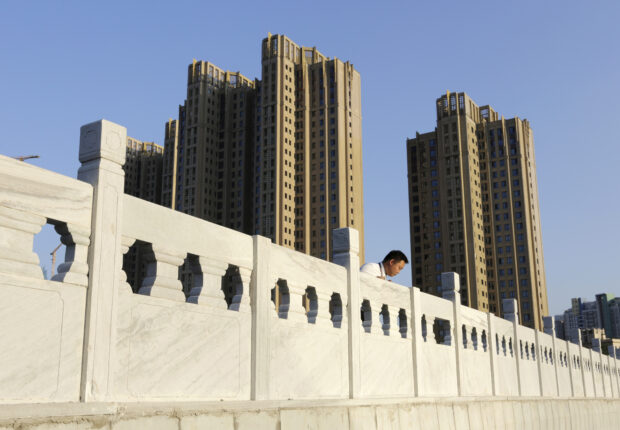China REITs plumb record lows as economic gloom lingers

A real estate agent staff member stands on a bridge near new apartment blocks in Beijing’s Wangjing area, China, Sept 18, 2015. REUTERS/Jason Lee/File photo
SHANGHAI/SINGAPORE — China’s real estate investment products are tumbling, extending last year’s slump as investors lose hope for a recovery in the economy and property assets such as industrial parks and logistics hubs.
Chinese real estate investment trusts (REITs), which issue shares to investors against a portfolio of real estate holdings, have hit successive lows in the first few days of 2024.
After tumbling 28 percent in 2023, the CSI REITs Index has dropped another 6.4 percent this year through a rare, seven-day losing streak driven by one REITs manager’s disclosure of cuts in warehouse rental prices and broader fears of falling yields.
The selloff reflects tumbling confidence in an economy where a deepening property crisis, weakening consumption and sputtering business activities have sapped demand for office buildings, warehouses and shopping malls.
READ: China’s property sales extend declines, weighing on outlook
Article continues after this advertisementIt also complicates Beijing’s efforts to lure investors into a nascent REIT market designed to channel badly needed cash to indebted local governments and property developers.
Article continues after this advertisement“In an economic downtrend, it’s getting harder and harder for REITs to make money,” said Xia Chun, chief economist at Forthright Holdings Co.
Although REITs derive yields from relatively stable fee or rental incomes generated by underlying assets such as office towers or warehouses, Xia said REITs trade more like stocks than bonds, with big ups and downs, particularly in China.
Biggest casualties
After some initial excitement after its 2020 launch, China’s REIT market has witnessed an eye-watering bubble burst. The REITs index has nearly halved from its early 2022 peak.
Most of China’s 29 listed REITs are backed by infrastructure assets such as industrial parks, tollways and sewage treatment plants. Other REITs backed by shopping malls and supermarkets will be launched this month.
In the latest bout of relentless selling, REITs backed by logistics properties were among the biggest casualties.
The Harvest Jingdong Warehousing and Logistics REIT has tumbled roughly 30 percent this year, taking a hit after its Jan. 4 disclosure that leasing fees at an underlying warehousing project in central Wuhan city had been cut by 13% in the new year.
CICC GLP Warehousing Logistics also plunged to record lows on fears it would be similarly affected.
Investors also dumped REITs backed by industrial parks amid signs vacancy rates are soaring. Vacancy at retail properties climbed to 9.1 percent at the end of September, from less than 6 percent in 2019, according to CBRE, showing the lingering impact on consumption from the COVID pandemic.
READ: China’s first publicly traded rental property REITs snapped up by investors
The Hua An Zhangjiang Industrial Park REIT has plunged 24 percent this year. Only 61 percent of space at an office building in Shanghai was rented out at the end of 2023, down from 94 percent six months earlier, its asset manager disclosed, citing the loss of a key tenant.
REITs dumped
Another REIT, CCB Principal Zhongguangcun Industrial Park, whose income is composed of office rents from tech start-ups in Beijing, has said government crackdowns on the internet sector and economic hardship had raised vacancy rates.
The meltdown has triggered a slew of stabilization measures by REIT managers, including trading suspensions, increased transparency, and investments by underlying properties’ biggest owners.
Fu Lei, senior executive at Tebon Asset Management, said China’s REIT market is dominated by risk-averse institutional investors.
That means volatility “triggers a rush for the exit … which in turn magnifies mood swings and invites more volatility”, he told an online roadshow on Wednesday.
Some investors, however, sense opportunity.
With most Chinese REITs trading below book value, and their cash dividend ratio climbing above 4.5 percent, “REITs are more appealing now than most of China’s equity or bond assets”, said Liu Xianyu, researcher of FoF investment at E Fund Management Co.